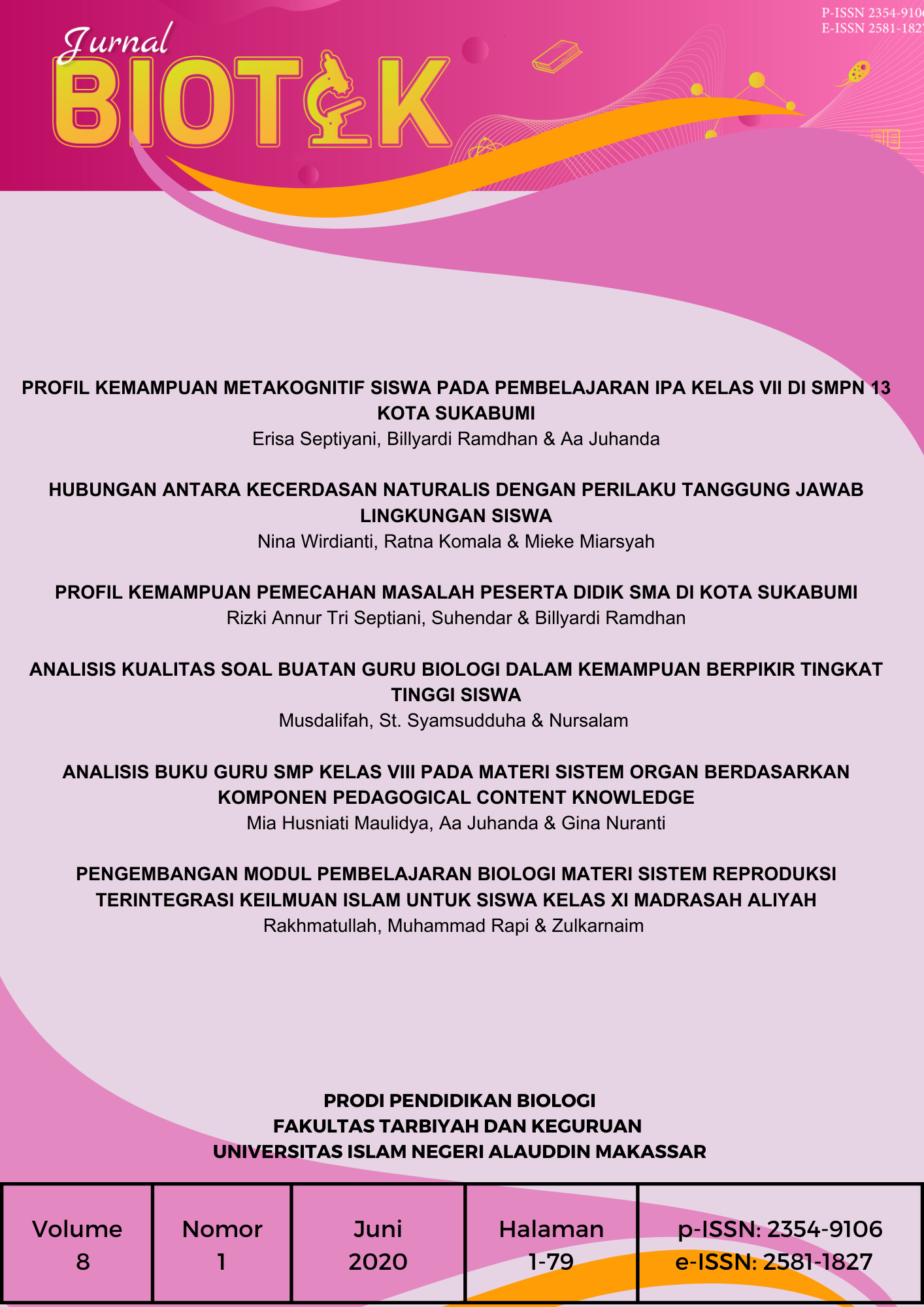HUBUNGAN ANTARA KECERDASAN NATURALIS DENGAN PERILAKU TANGGUNG JAWAB LINGKUNGAN SISWA
Abstrak
Naturalist intelligence is a person's ability to use, understand and classify flora, fauna and nature, along with their interactions, which are then used in solving environmental problems. Naturalist intelligence is one of the predictors relating to responsibility environmental behavior which is one of the efforts to solve environmental problems. This study aims to analyze the relationship between naturalist intelligence and the responsibility environmental behavior of students of SMP Negeri 51 Bandung. The number of respondents consisted of 220 students. The method used in this study is quantitative research with a correlational method. Naturalist intelligence data collection and responsibility environmental behavior using non-test instruments. Analysis of research data using a regression model test (α = 0.05) and correlation coefficient test with Pearson Product Moment test (α = 0.05). The results of the analysis show that there was a positive relationship between naturalist intelligence and responsibility environmental behavior students'.
##plugins.generic.usageStats.downloads##
Referensi
Amstrong, T. (2002). Seven Kinds of Smarts: Menemukan dan Meningkatkan Kecerdasan Anda Berdasarkan Teori Multiple Intelligence. Jakarta: Gramedia.
Athman, J.A., & Monroe, M.C. (2001). Elements of Effective Environmental Education Programs. Journal Enviromental Education, 37-48.
Arttachariya, P. (2009). Individual Determinants of Responsible Enviromental Behavior. ABAC Journal, 29(02), 14-22.
Azwar, S. (2012). Penyusun Skala Psikologi edisi 2. Yogyakarta: Pustaka Pelajar.
Cristie, Y. A., Sina, L., & Erawati, R. (2013). Dampak Kerusakan Lingkungan Akibat Aktivitas Pembangunan Perumahan. Jurnal Beraja Niti, 2(11), 1-21.
Derakhshan, A., & Faribi, M. (2015). Multiple Intelligences: Language Learning and Teaching. International Journal of English Linguistics, 5 (4), 63-72. https://doi.org/10.5539/ijel.v5n4p63
Gangadevi, S., & Ravi. (2014). Multiple Intelligence Based Curriculum To Enhance Inclusive Education To Bring Out Human Potential. International Journal of Advanced Research,. 2 (8), 619-626.
Gohar, M. J., & Sadeghi, N. (2015). Gardner’s Multiple Intelligence Theory and Foreign Language Achievement. International Journal of English and Education, 4(1), 206-216.
Hanggraeni, D. (2011). Perilaku Organisasi. Jakarta: Fakultas Ekonomi UI
Hines, J. M., Hungerford, H. R., & Tomera, A. N. (1986). Analysis and synthesis of research on responsible environmental behavior: A meta-analysis. J. Environ. Educ,18(2), 1–8. https://doi.org/10.1080/00958964.1987.9943482
Iskandar, Z. (2013). Psikologi Lingkungan, Metode dan Aplikasi. Bandung: Refika Aditama.
Iswari, R. D., & Utomo, S. W. (2017). Evaluasi Penerapan Program Adiwiyata untuk Membentuk Perilaku Peduli Lingkungan di Kalangan Siswa. Jurnal Ilmu Lingkungan, 15(1), 35-41. https://doi.org/10.14710/jil.15.1.35-41
Jamin, A., & Ohira, N. (2016). Filsafat Ilmu: Telaah Pengetahuan, Ilmu dan Sains dalam Studi Islam. Bandung: Alfabeta
Jena, L.K. and Behera, B. (2017), “Pork consumer preferences in Swaziland”, International Journal of Development and Sustainability, Vol. 6 No. 8, pp. 561-574.
Lazaer, D. (2000). Development of Multiple Intelligences. New York: McMillan Inc.
Manurung, N. (2013). Pemanfaatan Multiple Intelligence dalam proses pembelajaran. Jurnal Penelitian, Pemikiran dan Pengabdian, 124(1), 49-56.
Mauladin, D. (2013). The Effects of Learning Methods and Environmental Knowledge on Age 5-6 Naturalistic Intelligence (Experiment at AR – Ridho Nature Kindergaten Group B Tembalang Semarang). Asia Pacific Journal of Multidisciplinary Research, 1(1), 75-88.
Pan, S. L., Cou, L., Morrison, A. M., Huang, W. S., & Lin, M. C. (2018). Will the Future Be Greener? The Envirommental Behavior Intentions of University Tourism Students. Sustainbility, 10(603), 2-17. https://doi.org/10.3390/su10030634
Pediatri, S. (2005). Kecerdasan Majemuk pada Anak. 7(2): 85-92.
Riduwan. (2009). Pengantar Statistika Pendidikan, Sosial, Ekonomi, Komunikasi dan Bisnis. Bandung: Alfabeta.
Suhirman. (2012). Pengaruh Pembelajaran Berbasis Masalah dan Kecerdasan Naturalis terhadap Kemampuan Siswa dalam Memecahkan Masalah Lingkungan Hidup, Jurnal Pendidikan Lingkungan dan Pembangunan Berkelanjutan, 13(1), 1-14 https://doi.org/10.21009/PLPB.131.01
Vlek, C., & Steg, L. (2007). Human Behavior and Environmental Sustainability: Problems, Driving Forces, and Research Topics. Journal of Social Issues, 63(1), 1-19. https://psycnet.apa.org/doi/10.1111/j.1540-4560.2007.00493.x
Wilson, L. O. (1998). The Eight Intelligence: Naturalist Intelligence. New Horison for Learning. Quaterfly Jour
##submission.copyrightStatement##
##submission.license.cc.by-sa4.footer##Authors who publish with Jurnal Biotek agree to the following terms: Authors retain the copyright and grant Universitas Islam Negeri Alauddin Makassar right of first publication with the work simultaneously licensed under a Creative Commons Attribution License (CC BY-SA 4.0) that allows others to share (copy and redistribute the material in any medium or format) and adapt (remix, transform, and build upon the material) the work for any purpose, even commercially with an acknowledgement of the work's authorship and initial publication in Universitas Islam Negeri Alauddin Makassar. Authors are able to enter into separate, additional contractual arrangements for the non-exclusive distribution of the journal's published version of the work (e.g., post it to an institutional repository or publish it in a book), with an acknowledgement of its initial publication in Universitas Islam Negeri Alauddin Makassar. Authors are permitted and encouraged to post their work online (e.g., in institutional repositories or on their website) prior to and during the submission process, as it can lead to productive exchanges, as well as earlier and greater citation of published work (See The Effect of Open Access).

This work is licensed under a Creative Commons Attribution-ShareAlike 4.0 International License.



